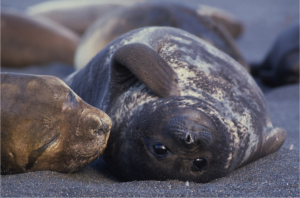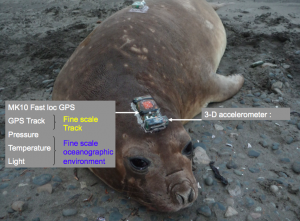Many people have yet to wonder how seals can make an impact in local marine environments. Naturally, the cute appearance of a marine animal comes to mind from our exposure to pictures or visits to aquariums. However, few of us know about the behaviour of seals, that in the way they catch their prey can actually provide valuable insight into the process of global warming. The research underway by Dr. Christophe Guinet and his team of researchers may be the missing link.
Tracking the fine movements of the elephant seals with data loggers allow researchers to measure the behaviour of the seal while underwater. It also gives us evidence on how climate change is directly affecting this important marine predator.
With advancements in technology, electronic devices have opened the doors to many new possibilities to research on foraging behaviour. This allows for the collection of data on these marine predators in their natural environment. Through an in-depth analysis on how these data loggers work, measurements on behavioural (location, diving depth, prey capture) and environmental (temperature, light) parameters gives us a chance to reference these results to the possible aspects of how seal foraging relates to global warming.
Audio clip: Adobe Flash Player (version 9 or above) is required to play this audio clip. Download the latest version here. You also need to have JavaScript enabled in your browser.
Southern elephant seals are important top predators to tag with data loggers because despite spending most of their time underwater and out of sight, they can dive depths ranging 1,000 – 2,000 feet and can even go as deep as 5,000 feet! Because they can spend up to 10 months at sea, they are able to collect a lot of data about the ocean and bring it back for the researchers to analyze.
Though we are making advances, humans are still limited by technology. This means that sometimes the equipment we have does not allow us to reach certain parts of the ocean. Southern elephant seals are helping us overcome this problem. Not only can they dive to depths that we have been unable to sample, but the seals also return to the same beach every year to molt and breed, which makes it easy for the scientists to come back each year to re-examine the data without having to capture the seals out at sea. Some researchers have organized the temperature data collected by the elephant seals into a format that other oceanographers can use and even uploaded it on the the World Ocean Database. Millions of new data points are made available to scientists worldwide thanks to the southern elephant seals.
Climate change will have an effect on all of us in our lifetime. Knowing what the ocean can tell us and who the key players in helping collect this data are will be instrumental to fixing this global challenge. Understanding southern elephant seals may be a major step in understanding our changing environment.
Posted by: Nakisa Kiai, Alice Koh, Gurdas Panesar, Jean Wang



